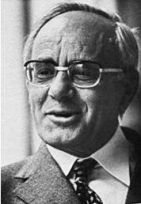
In spite of the magnificent results and perspectives of science, even the modern natural scientist, and the rest of us too who share this mentality, still remain to a large extent really imprisoned in a pre-scientific as well as a pre-philosophical and pre-theological perspective. For even today he and we along with him usually think at the unconscious and unreflexive level that it belongs precisely to the spirit of natural science to see man as a weak and incidental being who is exposed to a nature which is indifferent to him, until finally he is swallowed up again by a "blind" nature. It is only by a kind of schizophrenia that we have anything like a conception of man's dignity and abiding value and of the unique existence of each person. But the notion that man is an accidental and really unintended product of the history of nature, a caprice of nature, contradicts not only metaphysics and Christian faith, but basically it also contradicts natural science itself. If man does exist, and precisely if he is the "product" of nature, if he appears not just at any time at all, but at a definite point in this development, a point at which he himself can even direct this development at least partially by the fact that he now objectifies it and stands over against what has produced him, and transforms the producer itself, then this very nature become conscious of itself in him. But then it is directed towards him because "chance" is not a meaningful term for natural science, and the natural scientist infers from the result at least a movement directed towards it.
If we do not see it this way, then it makes no sense at all to see the history of the cosmos and that of man as a single history. But then human thought will sooner or later fall back into a platonic dualism again, for spirit will then have to feel like a stranger who is on earth by chance, and it will not allow itself for long to be disdained and abused as insignificant and powerless. If spirit is not regarded as the goal of nature itself, and if it is not seen that nature finds itself in spirit in spite of all the physical powerlessness of the individual person, then in the long run man will only be able to have validity as the disparate adversary of nature, and he will form this estimate of himself.
--Karl Rahner, Foundations of Christian Faith (1978), pp. 188-9.

1 comment:
Didn't Augustine conceive that the world was at least 500,000 years old? Have you read that the random mathematical chances of HAEM, the red coloring of hemoglobin, being spontaneous are 10 to the power of 680,while the earth's age is only 10 to the power of 18 seconds? ("Scientific Philosophers")
That implies a rather rapid mutation.It's a bit like Sir James Jeans' or Arthur Eddington's concept of so many monkeys blindly typing all the books of the British Museum in a million years (attributed to Huxley).Somebody calculated that they could have done only the first lines of a poem.
Post a Comment